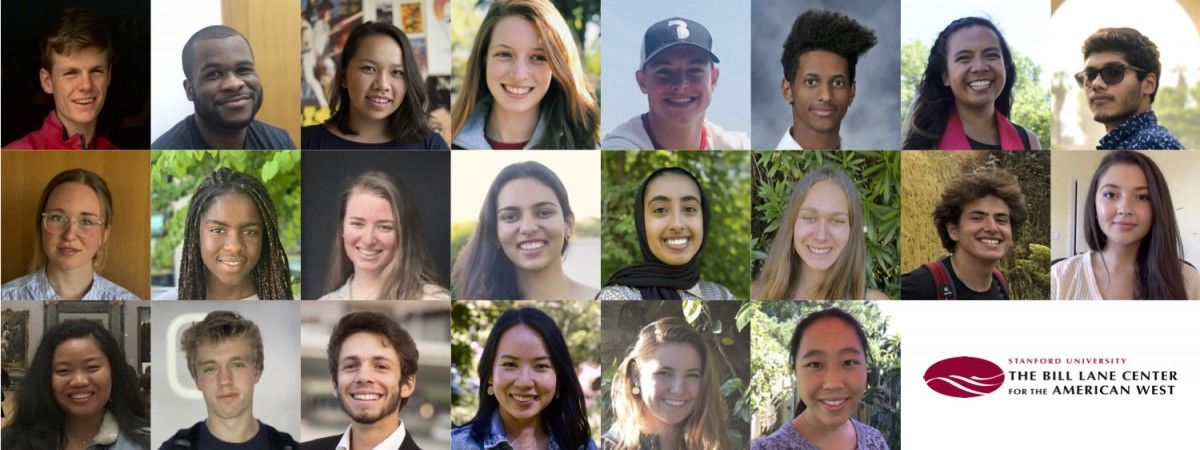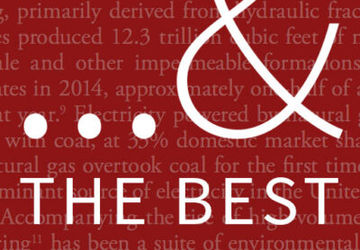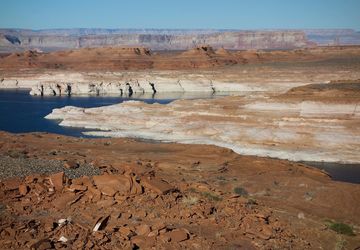
Photos (clockwise from lower left): We said a bittersweet goodbye to Preeti Hehmeyer, who left her role at the Lane Center for a position with the new Office of Community Engagement; Intern Cameron Tenner worked remotely on watershed management this summer; The album cover of a podcast on COVID and Native Health, produced by BLC research assistants; An eerie orange sky from Bay Area wildfires, which Lane Center researchers continued to study throughout 2020; Felicia Marcus, Landreth Fellow at our partner program Water in the West, did an expert Q&A on water policy for our "...& the West" blog; A photograph of a city-sponsored Black Lives Matter mural in front of Palo Alto City Hall, taken by summer intern Liqian Zhang. This year, the Lane Center partnered with neighboring cities to sponsor rapid research on policing reform and author events on racial justice.

Dear Friends of the Bill Lane Center,
2020 has certainly been an unusual and unprecedented year. Due to the ongoing coronavirus pandemic, the Bill Lane Center has been working remotely since March. While this has, sadly, led to the cancellation of some of our signature location-based programs, such as the Eccles Family Rural West Conference (planned for March 2020 in Nevada’s Carson Valley) and the annual Sophomore College field course (planned for September 2020 in the Columbia River Valley) we are proud of what we have been able to accomplish in spite of the pandemic, including record attendance at our 17 virtual programs. Our workshop on wildfire management, for example, shifted to an online format over the summer -- which turned out to be a historic, catastrophic wildfire season for the West. This year has shown us just how important our research on the links between health and environment can be. Although we haven’t been able to travel, the events of 2020 have reaffirmed our commitment to the vibrant places of the West -- and the people in them. Thanks to those of you who have joined us, from all corners of the West and beyond, for our online programs. We hope to see you, online or in person, soon.
Courses
We sponsored a number of courses this past year covering topics that are foremost in Westerners’ minds as the region contends with ongoing demographic, environmental and economic shifts.
In the winter of 2020, former Bureau of Land Management Director Pat Shea reprised his public lands course, What is Public about Public Lands? Who and How to Manage. Western public lands “have been the source of great opportunity, great scandals and almost constant dispute,” Shea said, noting that at least eight of the students enrolled in last year’s public lands class ended up taking jobs with not-for-profit organizations like the Nature Conservancy, or different ecosystem management groups. Much of their interest in this kind of work was sparked by talking with officials from different land management agencies during Shea’s course.
The Lane Center also sponsored the Urban Studies course Race and Ethnicity in Urban California, taught by Carol McKibben. Formerly known as the “Majority Minority State,” the class introduced students to some of the unique social, economic and political forces at play in California that have been driving the state’s rapid demographic transformation. The course also led to some additional programming, such as our May 2020 virtual event on McKibben’s book, “Beyond Cannery Row”.
Jennifer LeSar taught another Urban Studies course for us on the housing affordability crisis in California. Aware that housing affordability is both a deeply personal and broader, regional issue, LeSar offered her diverse group of students opportunities to reflect on their own experiences with the crisis, while also providing a framework for understanding the systems impacting housing policy, and how to move toward a balanced housing market. “My goal is for students to find their voice and bring their authentic voice wherever they go,” LeSar said, emphasizing her hope that students become active citizens, empowered to influence housing policy discussions.
After the success of our fall 2018 course on adapting to sea level rise, we offered a similar environmental governance and climate resilience course, this time focused on wildfire. I co-taught the class with Len Ortolano and graduate student Rebecca Miller, who put in a tremendous amount of work organizing the course’s culminating workshop on wildfire management. While we had to cancel the original, in-person workshop, Miller and all the panelists made a remarkable pivot to translate the content into a virtual format. In spring 2021, we look forward to a new iteration of the course that focuses on land use in the West.
As always, we taught our flagship American West course, doing it all on Zoom for the first time. Faculty even attended online sections to allow for greater interaction with students in spite of the remote format.
Internships

Top row, from left: Cameron Tenner, Claudia Kania, David Ludeke, Greyson Assa; Second row: Jess Dominick, Max Klotz, Nina Wagner, Zack Boyd; Third row: Zora Ilunga-Reed, Alex Evers, Liqian Zhang, Mondee Lu; Bottom row: Nathaniel Ramos, Sindhu Nathan, Wenxi Zhao
The Bill Lane Center usually dispatches undergraduate interns each summer to a dozen locations throughout the West. As a result of the pandemic, all 15 internships were remote this year, but we were able to maintain student placements with many host organizations. In summer 2020, we sponsored nine interns to serve the West from home, as well as six interns as part of the Shultz Energy Fellows program (co-sponsored with the Precourt Institute for Energy and Stanford in Government). Read more here and on the "Out West" student blog about our interns and their adventures with Yellowstone National Park, the Natural History Institute, the California Public Utilities Commission and more.
Research Assistantships

Our 22 student researchers all worked from home this summer, tackling urgent issues facing the American West.
The Lane Center also hosted a record number of in-house research assistants in 2020. Twenty-two research assistants, supervised by Iris Hui, Morris Fiorina from the Hoover Institution, Didi Kuo from CDDRL, and me, dove headfirst into pressing problems facing the West this summer. Projects focused on the response to and impacts of COVID-19, environmental regulation and air quality, wildfire management, and groundwater legislation. Read more about our student research here.
Our student researchers created a number of reports, articles, presentations, and other products based on their research. One highlight not to be missed is “Portraits of a Pandemic,” a podcast co-created by Hannah Kelley, ‘22, Aja Two Crows, ‘21 and Sophia Boyd-Fliegel, ‘21. Traveling between Seattle and the Navajo Nation, this podcast considers the disproportionate impact COVID-19 has had on Native communities.

Madison Pobis,‘19, MA ‘20: SEJ Award Winner
Pobis won a Society of Environmental Journalists Award for environmental reporting for her story “Small farmers wait for California’s groundwater hammer to fall,” published in our "...& the West" blog.

Cade Cannedy, '20: Firestone Medal
Cannedy, the third BLC Firestone winner in the past five years, won the medal for excellence in undergraduate research for his thesis on air quality regulation, built on three years of work at the Center under the supervision of Bruce Cain and Iris Hui.
Dee Fellows

At the graduate level, the Center welcomed, for the first time, two Thomas D. Dee II Fellows for the 2020-21 academic year. Charlotte S. Hull (left) a PhD candidate in history, and Rachel Heise Bolten (right), a PhD candidate in English, will spend the year in (virtual) residence at the Center as they pursue their dissertation research related to the North American West.
Aside from our undergraduates’ hard work, the Center’s research and publication agenda has been robust this year. Joyce Tagal, MA ‘20, joined us as a research associate focusing on police reform in the Bay Area. Over the summer, Tagal intensively studied policing reforms and presented her findings to city officials from San Mateo and Santa Clara counties. Tagal will continue her critical work in service of the wider region over the coming months.
Several of this year’s publications build on work from past programs. Along with Stanford Medicine, we issued a white paper on telehealth in the rural American West that draws upon our 2019 workshop on the topic. "World War II and the West It Wrought," a new book edited by Mark Brilliant and with a foreword by former Lane Center Co-Director David M. Kennedy, collects some perspectives from our 2017 conference of the same name. And friend of the Center Tom DeMund, ‘57 followed up his 2017 edition of "Walking the Farm" with a new book on hiking in Feather River Country -- something to consider if you’re in the region and looking for outdoor activities.

Iris Hui and I continued our research on collaborative governance and partisanship, with projects on how wildfires shrink partisan differences with regards to climate change, public perceptions of collaborative governance in transportation policy, and regional water management, among others.
As in other years, the “... & the West” blog has offered in-depth reporting on the issues facing our region. Most recently, Felicity Barringer has published a fascinating piece on how rural Western counties and towns have relied on the trust between citizens and local governments to keep coronavirus infections under control. Other issues the blog has detailed include the challenges associated with rural broadband access and “fire amnesia” in housing policy in California. This year, Barringer has begun supplementing the blog’s in-depth journalism and biweekly news roundups with Q&A-style articles, in which a prominent figure provides insight into a pressing issue facing the West. Look forward to more pieces like this Q&A with Felicia Marcus on drinking water in the Central Valley.
Transitions and Looking Ahead

Recently, we welcomed Hans Carstensen, Becca Levin and Rhea Suh to our Advisory Council, a group providing critical, ongoing guidance and support to the Center. We look forward to bringing on three more members in 2021 -- Suzanne Case, David Laney and Chuck Farman -- who will undoubtedly serve with the same dedication and engagement shown by our current advisory body. To our staff team, we welcomed Lydia Hailu to work on finance and administration at the Center, and said a bittersweet farewell to Associate Director Preeti Hehmeyer, who recently became the assistant vice president for community engagement at Stanford. We wish her the best in this new role and will continue to work with her on Western issues in partnership with the Office of Community Engagement. A recruitment for the Center’s next program manager is underway, and we welcome applications here.
2020 has been a year unlike any other. As we look to the new year, we are pleased to revive the State of the West symposium in a remote format and expand our internship program, for the first time, with offerings in both spring and summer quarters. We hope to see you next year -- on Zoom, on campus or elsewhere in the West. No matter how uncertain things might be, we can always count on all of you who sustain our work and community in the American West. Wishing you all the best for 2021.

Bruce E. Cain
Spence and Cleone Eccles Family Director
Charles Louis Ducommun Professor in Humanities and Sciences

Recent Center News
Image Credit: Getty Images




